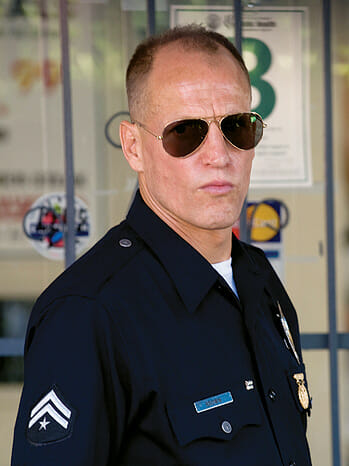Introducing Endless Mode: A New Games & Anime Site from Paste
Screenwriter Oren Moverman (Jesus’ Son, I’m Not There) made a small splash in 2009 with his well-received directorial debut, The Messenger. About two soldiers assigned to the Army Casualty Notification service, the film deservedly earned Woody Harrelson a Best Supporting Actor Oscar nod for his turn as a captain who regrets never having seen combat.
For his follow-up, Moverman once again turns his attention away from the main event (the Iraq War in his first film, the late-’90s Los Angeles Police Department scandal in his second) and focuses instead on peripheral players, in this case a Rampart division officer not directly involved in the corruption under investigation. But Moverman has gotten flashy in his sophomore (and sophomoric) effort, resulting in character, plot and imagery that are muddled and confusing.
Harrelson stars as Dave Brown, a beat cop whose questionable methods attract unwanted attention to a division already under investigation for widespread misconduct. Nicknamed “Date Rape” Dave for a vigilante murder he may or may not have committed years before, Officer Brown risks his career when he’s caught on tape beating a fleeing suspect. The ensuing inquiry strains his finances, which leads him to commit further violations of his oath of office.
Meanwhile, he’s got a kind of boho home life: His current companion (Anne Heche) is the sister of his ex-wife (Cynthia Nixon), he has one daughter with each woman, and they all live together on a Big Love-style compound, only he never gets to sleep with either sister-wife. (They’re both portrayed as such nags, who’d want to, anyway?) Instead, he trolls the bars for one-night stands and eventually develops a relationship with a lawyer (Robin Wright) whom he never really trusts as not having an ulterior motive.
If his professional and personal lives weren’t antithetical enough, Dave is additionally, apparently, incredibly intelligent—smart enough, anyway, to have been a lawyer, which he demonstrates by throwing around case law (although not smart enough to stay out of trouble). Also? He’s an anorexic binge eater.
Which isn’t to say Dave isn’t likable. He is. His teenage daughter accuses him of being a sexist, racist, homophobic pig—although, honestly, he doesn’t strike one as necessarily any of these things. He’s just old-school, enthusiastically so, and losing control. The problem is, no one around him has it any more together than he does, and the women in his life, particularly, are bitchy and/or basketcases.
Meanwhile, although the story, scripted by Moverman and James Ellroy, moves forward, it doesn’t feel linear, with gaps between events and plot threads that unravel. For example, a botched robbery certainly ratchets up the investigative pressure on Dave, but nothing is said of whatever happens to the much-needed money.
Most annoying is Moverman’s cryptic visual style. By shooting his characters from behind, or rotating his camera among characters without first establishing they’re all in the same room, or deliberately blocking the audience’s view of the characters and/or action, he’s employing a showy visual style without the substance to warrant it. Harrelson may have given another award-worthy performance here, despite the contrived role, but it’s lost amid the oblique visuals and storytelling.
